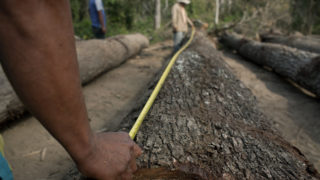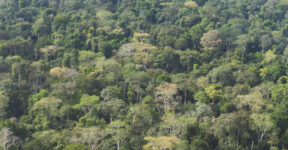
The Future of Independent Forest Monitoring
Richard Nyirenda and Aurelian Mbzibain from the University of Wolverhampton's Centre for International Development and Training (CIDT) outline the current state of play of Independent Foresting Monitoring in Africa and set out recommendations for how it can continue to play a strong role in reforming the sector.
Independent Forest Monitoring (IFM) has been part of global efforts to stop illegal logging, reduce deforestation and improve forest governance since the 1990s.
There is a long history of IFM in Central and West Africa, but, while there have been significant improvements in forest governance, deforestation and forest degradation have nevertheless continued at an alarming rate.
Yet, IFM in the Congo basin has progressed in leaps and bounds in recent years with a growing number of national and regional civil society organizations (CSOs) developing their expertise and strengthening their organizational capacities.
With mainly funding from the European Union (EU), UK Foreign, Commonwealth & Development Office (FCDO) and the Food and Agriculture Organization-European Union Forest Law Enforcement, Governance and Trade (FAO-EU FLEGT) Programme, these organizations have put in place financial management systems, gender policies, strategic plans and resource mobilization plans while also working to improve their technical knowledge and capabilities on forest monitoring and reporting.
In Cameroon, for example, a strengthened IFM network has prompted increased government enforcement in the forest sector. Coordinated by the non-governmental organization, Forêts et Développement Rural (FODER), the Standardized External Independent Monitoring System network (SNOIE) has been implementing an ISO 9001:2015 Quality Management System (QMS) since 2015. This provides for continuous internal and external independent audits, ensuring the traceability of all monitoring activities, as well as providing opportunities for continuous improvement and learning.
In the Republic of Congo, the mandated independent monitoring organization – Cercle d’Appui à la Gestion Durable des Forêts (CAGDF) – has so far been carrying the torch for IFM in the country although a few other organizations are involved in non-mandated activities too.
But, because of its formal agreement with the government, its remit is limited: it has mainly focused on forestry operations and it is not able to follow up on the enforcement of cases. This has meant it has had limited impact on the forest sector as a whole.
However, a new ‘SNOIE Congo’ system, involving a network of Congolese NGOs, based on the Cameroonian experience, has recently been established. These complementary initiatives will increase the capacity for IFM thereby enabling it to play a greater role in strengthening the country’s timber legality assurance system and monitoring progress with implementation of the country’s Voluntary Partnership Agreement (VPA).
In the Democratic Republic of Congo, Observatoire de la Gouvernance Forestière (OGF) has been working as the mandated IFM since 2013 and has established a nationwide independent monitoring network called the Réseau National des Observateurs Indépendants sur la Gouvernance Forestière en RDC (RENOI-RDC). In addition, OGF has also been piloting independent monitoring for Reducing Emissions from Deforestation and Forest Degradation (REDD+) initiatives.
In Gabon, Brainforest has been undertaking independent monitoring investigations since 2017. This work has included the provision of legal assistance to communities to enable them to claim their rightful benefits from large-scale forest exploitation.
Brainforest also coordinates a new coalition of eight community-based organizations and a community alert network of over 40 indigenous people and local community (IPLC) representatives throughout the country. The government has also made clear its commitment to inclusive land use planning, forest monitoring and forest governance, for example, through a 2017 Letter of Intent with the Central Africa Forest Initiative (CAFI) which provides a strong basis for further strengthening this work.
In the Central African Republic (CAR), the Centre pour l’Information Environnementale et le Développement Durable (CIEDD) began investigating forest sector legality in 2016 and found that there was very little law enforcement taking place. In response to this situation, CIEDD has undertaken forest monitoring in the country and has been implementing a number of tools to support the administration in fulfilling its oversight role, for example, establishing a Register of Infractions, a forest control manual and a forest and environmental crime working group.
In light of these developments, it is important to consider the key themes and trends relating to the future of IFM and how it could better help to reduce deforestation and degradation.
One of the key lessons to emerge from the work in the region is the value of a national level strategy for IFM. In many of the countries, IFM is currently undertaken by a plethora of organizations using a range of different approaches and methodologies often with overlapping roles, conflicts of interest and without effective modalities for coordination. This reduces the credibility of IFM in the eyes of key stakeholders such as the government, private sector and enforcement officials in timber importing countries.
In the Republic of Congo, for example, a strategic framework is being developed by CIDT and the CSO platform to bring all the independent monitoring organizations and stakeholders together. This is critical in ensuring that IFM is relevant and aligns with national forest and land use processes which in turn serves to build its credibility among stakeholders. A national strategy for IFM also helps to create a clear vision for CSOs to work towards and can reinforce ownership at the national level.
However, IFM needs to expand from its traditional focus on observing infringements and infractions related to timber harvesting to more investigative and data-based analysis.
Illegal deforestation and degradation is being driven by a range of economic activities and these encompass many new forms of forest crime. Current IFM methodologies must therefore evolve in order to address these.
New investigative approaches and capabilities are also needed that will allow independent monitoring to investigate complex value chains and to follow the finance that is fuelling forest crime. This shift should include strengthening linkages with national and international anti-corruption structures, the judiciary and other government agencies, such as all Ministries of Finance.
Within FLEGT and REDD+, a focus on the legality grid and safeguards would further strengthen the relevance of IFM and align it more strongly with national processes.
Independent monitoring organizations must also embrace the use of new tools and equipment. Already some tools to monitor changes in forest cover have been deployed by these organizations. For example, FLEGT Watch, which uses radar satellite data by independent monitoring organizations in the region to monitor illegal logging and deforestation.
Similarly, Forest Link enables communities to engage in real-time monitoring of economic activities in their forests and has been deployed in five countries in the region.
Independent monitoring organizations also need to incorporate the use of innovative technology such as drones in their efforts to collect real-time data and credible evidence particularly where access to areas of interest is restricted.
There is an urgent need to extend IFM beyond forestry and to harness its investigative and analytical potential in the monitoring of decisions and actions in other sectors including mining and agricultural commodities.
In Cameroon, for example, FODER is focussing on the mining sector while, in Gabon, Brainforest has undertaken monitoring missions targeting the large-scale agricultural sector.
Elsewhere there is increasing demand particularly from consumer country stakeholders for IFM to be extended to the monitoring of commodity supply chains and zero-deforestation commitments.
IFM could also enlarge its focus to encompass CITES listed species, for example, helping to ensure that CITES permits and quotas are respected. Lessons from monitoring the illegal wildlife trade (IWT) from the Eco Activists for Governance and Law Enforcement (EAGLE) network, such as collaborative law enforcement actions with the judiciary, also warrant further exploration.
Experience of undertaking independent monitoring in the forest sector points to the critical role it plays in supporting indigenous peoples and local communities (IPLCs) to claim their rights which constitutes important transferable learning particularly given the growing demand on land from agriculture and other sectors.
Finally, Congo basin countries have included a range of forest-related targets in their nationally determined contributions (NDCs) and IFM will also be important in monitoring the implementation of these targets.
Legal recognition of IFM is needed in many countries so that it is more widely accepted – both by government and industry stakeholders. In the Republic of Congo, IFM is provided for in the 2020 forest code while the CAR and Liberia VPAs both provide for IFM.
However, in many other countries civil society-led independent monitoring still lacks legal recognition and acceptance. Legal recognition is of critical importance to help ensure access to public information and documentation and to provide protection for whistle-blowers which are both essential to the implementation of IFM. The establishment of a legally-binding commitment from governments to respond to IFM reports, therefore, is needed.
The development and certification of SNOIE in Cameroon has improved the quality of IFM and quality management systems should be developed and implemented in other countries in order to improve its implementation and credibility across the region.
These systems do not necessarily need to be certified but, as a minimum standard, each independent monitoring organization should put in place a robust internal system that involves a third-party assessment mechanism. This will help to ensure that independent monitoring organizations are clear about what their objectives are i.e. why they are involved in IFM, what the change is that they want to see and what their expectations are with regard to their stakeholders.
Strong links between IFM and advocacy nationally and internationally is critical in the face of inertia and a lack of response from officials to ensure that the evidence generated is used by decision-makers for law enforcement.
Regional IFM platforms such as the Plateforme Africaine de l’Observation Indépendante (PAOI) – a pan-African independent monitoring platform which brings together IFM organizations – are well-placed to support both national advocacy networks and regional and international advocacy movements through strengthening voice, capacity-building and participation.
Furthermore, by linking with international activist organizations and media platforms, there is the potential to reach consumers of African-produced forest and agricultural commodities in other parts of the world to raise awareness of the role of their consumption behaviours in driving illegal deforestation and degradation.
Sustainable funding for IFM remains a major challenge. So far, support has been sporadic and project-based thereby hindering efforts to build and embed the capability that is needed to ensure the sustainability of IFM activities in Africa.
Drawing on lessons learnt in Indonesia, future funding of IFM could be considered under a Congo basin independent monitoring fund to support monitoring activities and capacity-building.
The PAOI network, given its regional coverage and expertise, is well-placed to manage such a fund and to provide training. IFM, and the generation of reliable forestry information, is a public good that requires long term funding and, a fund of this kind, would further strengthen both the independence and the reach of IFM.
Ultimately, IFM plays a crucial role in fighting corruption, increasing transparency and detecting forest crimes and illegal land use. However, as an approach, IFM must continue to innovate in order to remain focused on the key drivers of deforestation and degradation. This will require those CSOs undertaking IFM to build new capacities and capabilities while sustained and sustainable funding will also be essential to enable CSOs to continue to fulfil their watchdog role more effectively in a rapidly evolving context.


